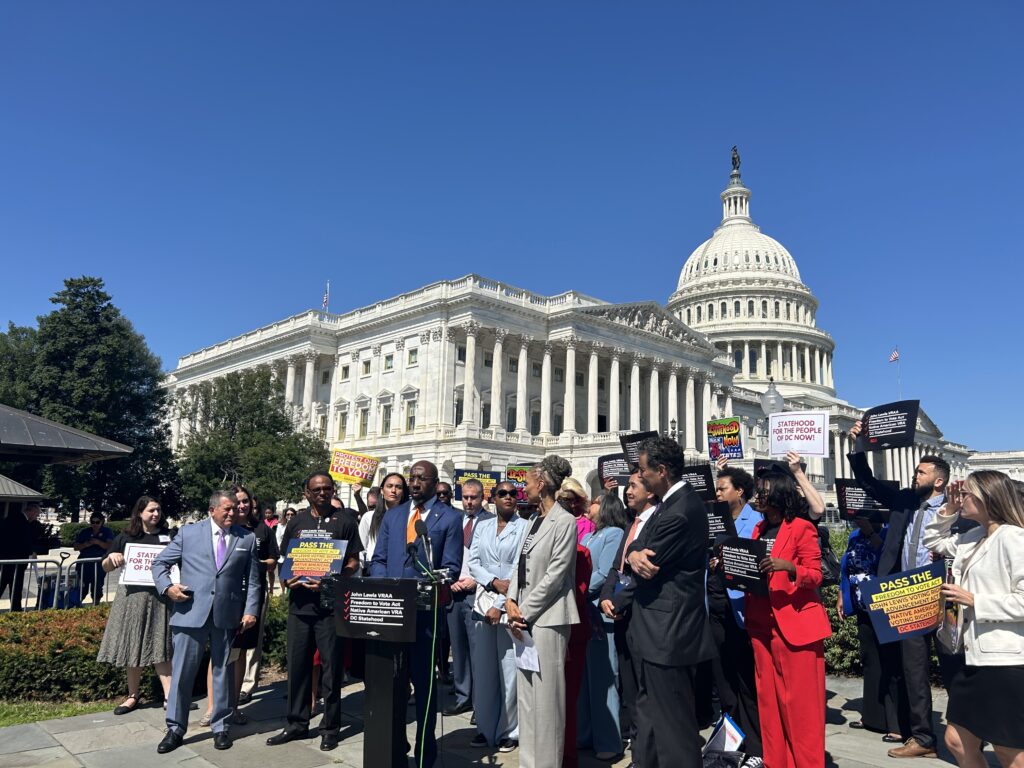Congressional Democrats, Activists Renew Push for Passage of Four Voting Rights Bills

“What do we want? Democracy! When do we want it? Now!”
These words were chanted repeatedly in front of the U.S. Capitol on Tuesday by some House and Senate Democrats and numerous activists during an event announcing the renewed push to pass four voting rights bills in Congress.
The John Lewis Voting Rights Advancement Act (VRAA), the Freedom to Vote Act, the Native American Voting Rights Act and a DC Statehood bill comprise the pro-democracy package being discussed less than two months away from the 2024 election.
“Voting rights is always a top priority for me,” Sen. Raphael Warnock (D-Ga.) said. “I know that an election is around the corner, but there is no more important issue in a democracy than the health of the democracy itself.”
Warnock, who represents a crucial swing state that has faced numerous attacks on voting rights, said the voices of every eligible voter need to be heard.
Rep. Terri Sewell (D-Ala.), the author and sponsor of the John Lewis VRAA, said the fight for voting rights is personal to her as someone who’s from Selma, Alabama. She said people need to remember how hard John Lewis and many others fought for this sacred right in the 1960s.
“Never did I think that the cause for which they fought almost 60 years ago would become our cause, too. Didn’t we win that fight? Didn’t we get the Voting Rights Act of 1965?” Sewell said.
“But, it goes to show you that progress is elusive, and every generation has to hold on to the progress that we made and try to advance it,” Sewell said.
The John Lewis VRAA would restore the preclearance requirements that were slashed when the U.S. Supreme Court struck down Section 5 of the Voting Rights Act in its Shelby County v. Holder decision.
“States and local governments with histories of discrimination would once again have changes to their voting laws reviewed in order to prevent restrictive, discriminatory voting laws from taking effect,” Sewell wrote in an Op-Ed for Democracy Docket.
Janai Nelson, president and director-counsel of the NAACP Legal Fund, said during the event the Brennan Center for Justice reported that over 100 restrictive voting laws have been passed in at least 31 states since the Shelby v. Holder ruling. She also noted that during the 2024 legislative session, 291 restrictive bills were considered in 40 states across the country.
“When people go to vote this November in 28 states, they will be facing voting laws that they did not face in the last presidential election — voting laws that restrict their right to vote,” Nelson said.
Sen. Amy Klobuchar (D-Minn.), another champion for voting rights in Congress, said the John Lewis VRAA and the Freedom to Vote Act — which would establish national voting standards, end partisan gerrymandering, tackle felony disenfranchisement and more — both passed the House but failed to pass the Senate
The solution: making voting rights bills exempt from filibusters.
“There have been over 100 exemptions in the history of America, and voting and civil rights should be one of those exemptions,” Klobuchar said. “Nothing is more fundamental than the right to vote.”
Monica Hopkins, executive director of the ACLU of DC, spoke about the importance of passing a bill to make Washington, D.C. a state and give the city’s residents representation in Congress.
“If you care about voting rights, if you care about our democracy, you cannot do it by leaving out the 700,000 residents of the District of Columbia, and we are so glad to be standing in solidarity with such a powerful group,” Hopkins said. “The time for DC statehood is now.”
Also during the event, Rep. Joe Morelle (D-N.Y.) underscored the importance of the Native American Voting Rights Act.
“The Native American Voting Rights Act expands pro-voter measures, like providing ballot drop boxes, increasing early in-person voting opportunities and validating tribal ID as an acceptable form of voting identification — something that you wouldn’t think you’d have to write in the federal law, but we do,” Morelle said.
He explained that all four of these bills are being presented as a package because they are all necessary to expand ballot access and improve our election system.
“We cannot settle for passing one. We cannot settle for passing two. We will pass all of them,” Morelle said. “We cannot settle for anything less than fully protecting American democracy.”
This current Congress will be in office until Jan. 3, and then a new House and Senate, elected during the 2024 election, will come in. The party majorities in both chambers could change. However, many representatives and activists said that no matter what happens, they’ll remain hopeful for the future of our democracy.
“Democracy will not die on our watch,” Nelson said.